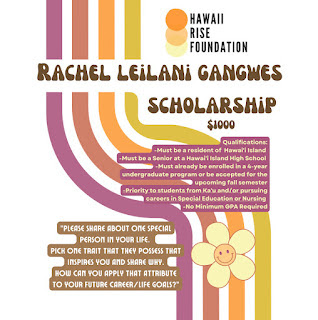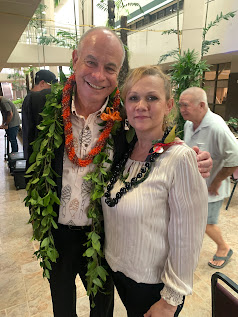"Over ten years ago, energy company Hu Honua had a brainwave: it could produce renewable energy by burning trees. The company sought regulatory approval to supply energy to Hawaiʻi Island using a biomass power plant. Last summer, approval for that energy deal was denied. Hu Honua appeals the denial, arguing that the Public Utilities Commission misunderstood its mandate and held Hu Honua to an unfair standard.
"We disagree. The PUC understood its public interest-minded mission. It faithfully followed our remand instructions to consider the reasonableness of the proposed project’s costs in light of its greenhouse gas emissions and the project’s impact on intervenor Life of the Land’s members’ right to a clean and healthful environment. It stayed true to the language of its governing statute HRS § 269-6(b) (Supp. 2021) by measuring the project’s cost and system impact. And it acted properly within its role as fact-finder when it evaluated Hu Honua by its own statements and promises and, ultimately, found them unconvincing.
"Finding no error, we affirm the PUC’s decision rejecting the power purchase agreement between Hu Honua and the Hawaiʻi Electric Light Company, Inc."
"Finding no error, we affirm the PUC’s decision rejecting the power purchase agreement between Hu Honua and the Hawaiʻi Electric Light Company, Inc."
Referring to the PUC's rejection of Hu Honua, the Justice also wrote:
"In the order, the PUC found that the project would produce massive GHG emissions, and that Hu Honua’s promise of carbon neutrality rested on speculative, uncertain assumptions. The commission expressed serious doubts that Hu Honua could actually live up to its sequestration estimates. It pointed out that Hu Honua had no firm plans for leasing land to plant trees. Using the carbon calculator provided by Hu Honua, the commission found that even changes as small as one-percent in Hu Honua’s emissions and sequestration estimates would make the project a net carbon emitter. The commission calculated that the back-up money Hu Honua pledged, even if carbon offsets were available at the rate it expected, would only buy 30,000 metric tons of carbon offsets — less than one sixth of the carbon the project (per Hu Honua’s own estimates) would emit annually.
"The PUC was particularly troubled by the frontloading of GHG emissions in the project. While Hu Honua pledged to be carbon neutral on an annual basis by the end of 2035, the commission determined (again based on Hu Honua’s numbers) that the overall impact of the project would not be carbon neutral until 2047, two years after Hawaiʻi’s 2045 zero emissions target came and went. For the first 25 years of the project, Hu Honua would be a significant net emitter. If Hu Honua did not meet its sequestration commitments, the PUC feared that the damage to the atmosphere could not be easily undone.
"The PUC also found that the Amended PPA would significantly increase costs for rate-payers. Six years into the project, the fuel price was set to spike 15%, for no discernible reason. That spike – in combination with other pricing terms and adjustments for inflation – meant that the cost would continually rise. Overall, the PUC found that the project would increase the typical consumer bill by an average of $10.97 a month throughout the full 30-year term. The PUC deemed this a significant bill impact. HELCO stated that there were no realistic modeling assumptions under which the project “could produce a net savings to the system or customer.” Based on the project’s high GHG emissions, the PUC did not
consider these higher costs to consumers reasonable.
"The PUC had another big time concern. The commission found that not only would the project fail to accelerate the retirement of fossil-fuel, it would displace other, more environmentally friendly renewable resources. Hu Honua said that its plant would only displace the fossil fuel-based Keāhole power plant. However, HELCO, which actually controls energy dispatch, testified that this claim was “unrealistic” and “contrary to [HELCO’s] practices” and “actual operational conditions.” HELCO said that it would be “impossible” for the project to avoid displacing other renewable resources. The Consumer Advocate, a statutorily-mandated party to the proceedings, estimated that almost 60% of Hu Honua’s generation would replace renewable energy generation. Here, the commission credited the testimony of HELCO and the Consumer Advocate over Hu Honua’s. The PUC also credited HELCO’s testimony that the Hu Honua project filled no pressing need in its power grid.
"Summing up, the PUC found that the proposed project would emit substantially more carbon than it sequestered for at least the first 25 years of operation and raise ratepayer prices for the full term. And the PUC found Hu Honua’s promise of eventual carbon neutrality speculative at best. Based on these findings, the PUC concluded that the Amended PPA was not in the public interest. It rejected the agreement.
Hawai'i Supreme Court Associate Justice Michael D. Wilson also wrote his opinion:"In the order, the PUC found that the project would produce massive GHG emissions, and that Hu Honua’s promise of carbon neutrality rested on speculative, uncertain assumptions. The commission expressed serious doubts that Hu Honua could actually live up to its sequestration estimates. It pointed out that Hu Honua had no firm plans for leasing land to plant trees. Using the carbon calculator provided by Hu Honua, the commission found that even changes as small as one-percent in Hu Honua’s emissions and sequestration estimates would make the project a net carbon emitter. The commission calculated that the back-up money Hu Honua pledged, even if carbon offsets were available at the rate it expected, would only buy 30,000 metric tons of carbon offsets — less than one sixth of the carbon the project (per Hu Honua’s own estimates) would emit annually.
"The PUC was particularly troubled by the frontloading of GHG emissions in the project. While Hu Honua pledged to be carbon neutral on an annual basis by the end of 2035, the commission determined (again based on Hu Honua’s numbers) that the overall impact of the project would not be carbon neutral until 2047, two years after Hawaiʻi’s 2045 zero emissions target came and went. For the first 25 years of the project, Hu Honua would be a significant net emitter. If Hu Honua did not meet its sequestration commitments, the PUC feared that the damage to the atmosphere could not be easily undone.
"The PUC also found that the Amended PPA would significantly increase costs for rate-payers. Six years into the project, the fuel price was set to spike 15%, for no discernible reason. That spike – in combination with other pricing terms and adjustments for inflation – meant that the cost would continually rise. Overall, the PUC found that the project would increase the typical consumer bill by an average of $10.97 a month throughout the full 30-year term. The PUC deemed this a significant bill impact. HELCO stated that there were no realistic modeling assumptions under which the project “could produce a net savings to the system or customer.” Based on the project’s high GHG emissions, the PUC did not
 |
| Justice Todd W. Edins |
"The PUC had another big time concern. The commission found that not only would the project fail to accelerate the retirement of fossil-fuel, it would displace other, more environmentally friendly renewable resources. Hu Honua said that its plant would only displace the fossil fuel-based Keāhole power plant. However, HELCO, which actually controls energy dispatch, testified that this claim was “unrealistic” and “contrary to [HELCO’s] practices” and “actual operational conditions.” HELCO said that it would be “impossible” for the project to avoid displacing other renewable resources. The Consumer Advocate, a statutorily-mandated party to the proceedings, estimated that almost 60% of Hu Honua’s generation would replace renewable energy generation. Here, the commission credited the testimony of HELCO and the Consumer Advocate over Hu Honua’s. The PUC also credited HELCO’s testimony that the Hu Honua project filled no pressing need in its power grid.
"Summing up, the PUC found that the proposed project would emit substantially more carbon than it sequestered for at least the first 25 years of operation and raise ratepayer prices for the full term. And the PUC found Hu Honua’s promise of eventual carbon neutrality speculative at best. Based on these findings, the PUC concluded that the Amended PPA was not in the public interest. It rejected the agreement.
 |
| Justice Michael D. Wilson |
"Given the climate emergency, and the need to limit atmospheric CO2 concentrations to below 350 ppm in order to leave Hawai‘i’s future generations a habitable earth, approval of the amended PPA would violate the people of Hawai‘i’s right to a life-sustaining climate system. Because the PUC properly evaluated the Project’s emissions—and found them to be unacceptably high given the impending climate emergency—it complied with its duty to protect the right of Hawai‘i’s people to a life-sustaining climate system.
"We are facing a sui generis climate emergency. The lives of our children and future generations are at stake. With the destruction of our life-sustaining biosphere underway, the State of Hawai‘i is constitutionally mandated to urgently reduce its greenhouse gas emissions in order to reduce atmospheric CO2 concentrations to below 350 ppm.
"I join with the Majority opinion. In concurrence, it is noted that in this time of dire climate emergency, the people of Hawaiʻi have the protection of the right to a life-sustaining climate system derived from substantive due process pursuant to Article I, section 5 and the public trust doctrine enshrined in Article XI, section 1 of the Hawaiʻi Constitution."
ROLLING BLACKOUTS WERE NOT PLANNED FOR KAʻŪ AND VOLCANO on Tuesday evening, as Hawaiian Electric initiated 30-minute rolling outages in parts of Hawaiʻi Island. The situation involves unexpected loss of two large generators and calm weather taking wind resources down to near zero.
Outages were set to start in Ainaloa and Pāhoa, Captain Cook to Honaunau, and Halaula along Akoni Pule Highway from Iole Road to Niuli Place at about 6:45 p.m. The brief emergency outages "are initiated in various areas around the island to protect the electric system and prevent loss of power to an even greater number of customers. The impacted areas and the timing of the outages are based on the amount of
Earlier on Tuesday, Hawaiian Electric urged customers to conserve energy as much as possible, especially between 5 p.m. and 9 p.m. Commercial customers were also asked to voluntarily reduce electricity usage.
"We apologize for the need to initiate rolling blackouts this evening and appreciate the patience of all who are impacted," said Kristen Okinaka, spokesperson for Hawaiian Electric's operations on Hawai'i Island. "We are faced with a generation shortfall, and it's necessary to leave some people without power for short periods to protect the entire electrical grid until needed generation can be returned to service."
Hawaiian Electric advised impacted customers to unplug televisions, computers and other electronics and appliances to protect them from electrical surges when power is restored, and to minimize opening refrigerator-freezer doors while power is out.
"The need to conserve is prompted by the unavailability of two large generators. Hamakua Energy tripped offline and is undergoing repairs and Hawaiian Electric's Hill Plant Unit #6 is offline due to a mechanical issue. Combined, these units supply about 80 megawatts of power. In addition, wind resources are forecast to be near zero, said the Hawaiian Electric statement. See @HIElectricLight on Twitter for updates.
Volcano Evening Market, Cooper Center, Volcano Village, Thursdays, 3 p.m. to 6 p.m., with live music, artisan crafts, ono grinds, and fresh produce. See facebook.com.
Volcano Swap Meet, fourth Saturday of the month from 8 a.m. to noon. Large variety of vendors with numerous products. Tools, clothes, books, toys, local made healing extract and creams, antiques, jewelry, gemstones, crystals, food, music, plants, fruits, and vegetables. Also offered are cakes, coffee, and shave ice. Live music. Volcano Farmers Market, Cooper Center, Volcano Village on Sundays, 6 a.m. to 10 a.m., with local produce, baked goods, food to go, island beef and Ka'ū Coffee. EBT is used for Supplemental Nutrition Assistance Program, formerly Food Stamps. Call 808-967-7800.
O Ka'ū Kākou Market, Nā'ālehu, Wednesdays, 8 a.m. to 2 p.m. Contact Nadine Ebert at 808-938-5124 or June Domondon 808-938-4875. See facebook.com/OKauKakouMarket.
Ocean View Community Market, Saturdays and Wednesdays, 6:30 a.m. to 2 p.m., corner Kona Dr. Drive and Hwy 11, near Thai Grindz. Masks mandatory. 100-person limit, social distancing required. Gate unlocked for vendors at 5:30 a.m., $15 dollars, no rez needed. Parking in the upper lot. Vendors must provide their own sanitizer. Food vendor permits required. Carpooling is encouraged.
"I join with the Majority opinion. In concurrence, it is noted that in this time of dire climate emergency, the people of Hawaiʻi have the protection of the right to a life-sustaining climate system derived from substantive due process pursuant to Article I, section 5 and the public trust doctrine enshrined in Article XI, section 1 of the Hawaiʻi Constitution."
 |
| Hu Honua's biomass burning plant to make electricity was rejected by Hawai'i Supreme Court. Photo from Life of the Land |
ROLLING BLACKOUTS WERE NOT PLANNED FOR KAʻŪ AND VOLCANO on Tuesday evening, as Hawaiian Electric initiated 30-minute rolling outages in parts of Hawaiʻi Island. The situation involves unexpected loss of two large generators and calm weather taking wind resources down to near zero.
Outages were set to start in Ainaloa and Pāhoa, Captain Cook to Honaunau, and Halaula along Akoni Pule Highway from Iole Road to Niuli Place at about 6:45 p.m. The brief emergency outages "are initiated in various areas around the island to protect the electric system and prevent loss of power to an even greater number of customers. The impacted areas and the timing of the outages are based on the amount of
Earlier on Tuesday, Hawaiian Electric urged customers to conserve energy as much as possible, especially between 5 p.m. and 9 p.m. Commercial customers were also asked to voluntarily reduce electricity usage.
"We apologize for the need to initiate rolling blackouts this evening and appreciate the patience of all who are impacted," said Kristen Okinaka, spokesperson for Hawaiian Electric's operations on Hawai'i Island. "We are faced with a generation shortfall, and it's necessary to leave some people without power for short periods to protect the entire electrical grid until needed generation can be returned to service."
Hawaiian Electric advised impacted customers to unplug televisions, computers and other electronics and appliances to protect them from electrical surges when power is restored, and to minimize opening refrigerator-freezer doors while power is out.
"The need to conserve is prompted by the unavailability of two large generators. Hamakua Energy tripped offline and is undergoing repairs and Hawaiian Electric's Hill Plant Unit #6 is offline due to a mechanical issue. Combined, these units supply about 80 megawatts of power. In addition, wind resources are forecast to be near zero, said the Hawaiian Electric statement. See @HIElectricLight on Twitter for updates.
To read comments, add your own, and like this story, see facebook.com/kaucalendar. See latest print edition at kaucalendar.com, in the mail and on stands.
 |
| In the mail and on stands. |
FREE FOOD
St. Jude's Hot Meals are free to those in need on Saturdays from 9 a.m. until food runs out, no later than noon. Volunteers from the community are welcome to help and can contact Karen at pooch53@gmail.com. Location is 96-8606 Paradise Circle Drive in Ocean View. Those in need can also take hot showers from 9 a.m. to noon and use the computer lab from 9:30 a.m. to 1 p.m.
Free Meals Mondays, Wednesdays, and Fridays are served from 12:30 p.m. to 3:30 p.m. at Nā'ālehu Hongwanji. Volunteers prepare the food provided by 'O Ka'ū Kākou with fresh produce from its gardens on the farm of Eva Liu, who supports the project. Other community members also make donations and approximately 150 meals are served each day.
OUTDOOR MARKETS
St. Jude's Hot Meals are free to those in need on Saturdays from 9 a.m. until food runs out, no later than noon. Volunteers from the community are welcome to help and can contact Karen at pooch53@gmail.com. Location is 96-8606 Paradise Circle Drive in Ocean View. Those in need can also take hot showers from 9 a.m. to noon and use the computer lab from 9:30 a.m. to 1 p.m.
Free Meals Mondays, Wednesdays, and Fridays are served from 12:30 p.m. to 3:30 p.m. at Nā'ālehu Hongwanji. Volunteers prepare the food provided by 'O Ka'ū Kākou with fresh produce from its gardens on the farm of Eva Liu, who supports the project. Other community members also make donations and approximately 150 meals are served each day.
OUTDOOR MARKETS
-1.jpg) |
| https://www.okaukakou.org/scholarships -for-local-students |
Volcano Swap Meet, fourth Saturday of the month from 8 a.m. to noon. Large variety of vendors with numerous products. Tools, clothes, books, toys, local made healing extract and creams, antiques, jewelry, gemstones, crystals, food, music, plants, fruits, and vegetables. Also offered are cakes, coffee, and shave ice. Live music. Volcano Farmers Market, Cooper Center, Volcano Village on Sundays, 6 a.m. to 10 a.m., with local produce, baked goods, food to go, island beef and Ka'ū Coffee. EBT is used for Supplemental Nutrition Assistance Program, formerly Food Stamps. Call 808-967-7800.
O Ka'ū Kākou Market, Nā'ālehu, Wednesdays, 8 a.m. to 2 p.m. Contact Nadine Ebert at 808-938-5124 or June Domondon 808-938-4875. See facebook.com/OKauKakouMarket.
Ocean View Community Market, Saturdays and Wednesdays, 6:30 a.m. to 2 p.m., corner Kona Dr. Drive and Hwy 11, near Thai Grindz. Masks mandatory. 100-person limit, social distancing required. Gate unlocked for vendors at 5:30 a.m., $15 dollars, no rez needed. Parking in the upper lot. Vendors must provide their own sanitizer. Food vendor permits required. Carpooling is encouraged.
















